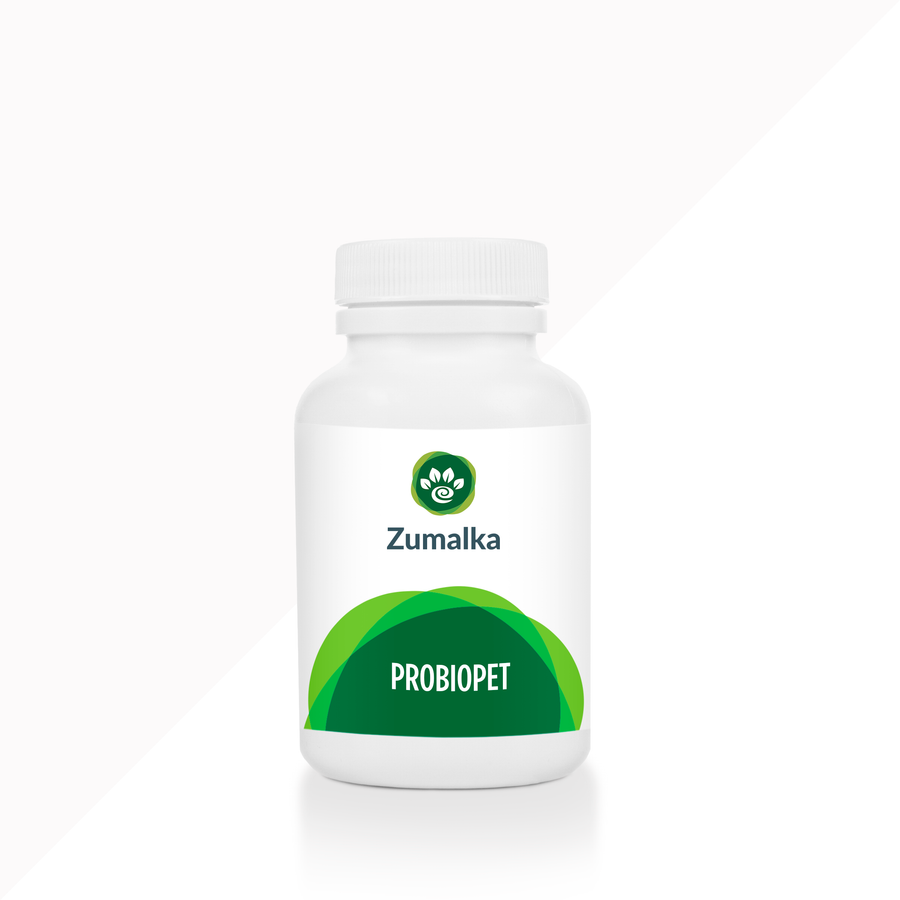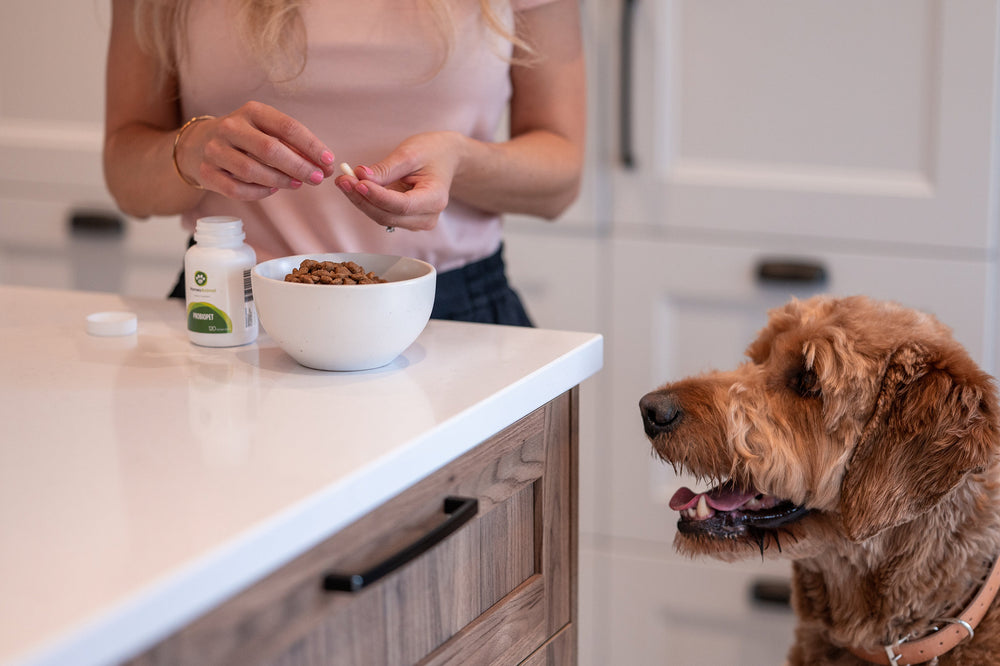What Can I Give My Dog for Diarrhea? Vet Approved Home Remedies That Work
Did you know that your dog's diarrhea doesn't always require a trip to the vet? In fact, many mild cases can be managed naturally at home. In this article, I'll guide you through everything you need to know to help your dog recover from watery diarrhea and get back to feeling their best.
Causes of Acute Diarrhea in Dogs

Before we dive into tips on how to treat your dog's diarrhea at home, it’s important to briefly discuss some common causes of this problem.
- Common triggers for canine diarrhea include dietary indiscretion, where your pooch consumes inappropriate items like garbage, spoiled food, or table scraps. Besides disrupting your dog's bowel movements, it can also cause painful blockage in the gastrointestinal tract.
- Bacterial infections such as Campylobacter and Salmonella are more common in puppies than in adult dogs and can lead to diarrhea. Inflammatory bowel disease (IBD) can also give rise to this issue.
- Viral infections, particularly the parvovirus, often result in bloody diarrhea in young puppies. In such cases, immediate veterinary attention at the nearest emergency animal hospital is crucial. An underlying cause like kidney disease can also set off canine diarrhea.
- Additionally, intestinal parasites and certain human medications like non-steroidal anti-inflammatories or Pepto-Bismol can also induce diarrhea in dogs. Given these reasons, diarrhea in dogs can be a very serious concern if neglected.
It is crucial to note that chronic diarrhea requires prompt veterinary attention. If your pet experiences prolonged bouts of diarrhea, contact your vet right away. The sooner the issue is addressed, the better the chances of a successful recovery.
How Do I Deal With My Dog's Diarrhea At Home?

What can I give my dog for diarrhea at home? This is one of the most common questions pet parents ask me when their dog is experiencing mild loose stools.
#1. Temporarily stop giving your canine companion food.
To allow your dog’s inflamed digestive tract to rest and heal from mild diarrhea, it’s important to withhold all food, including treats, for at least 8 hours. Feeding rich or complex foods during this time can aggravate inflammation and delay recovery.
#2. Try a bland diet.
After an 8-hour fasting period, it’s advisable to gradually reintroduce food to your dog, starting with a bland, low-fat diet that includes a simple carbohydrate (such as white rice), a lean protein (like boiled chicken), and fiber (such as pumpkin). Here are some recommended combinations to help treat your dog's diarrhea:
- Cooked (boiled) chicken breast and white rice with psyllium husk
- Boiled turkey breast and white rice with psyllium husk
- Cooked hamburger meat (ground beef) with plain cooked white rice and psyllium husk
- Cottage cheese with cooked white rice and psyllium husk
#3. Fiber is key.
Adding soluble fiber, such as psyllium, to your dog's diet can improve stool consistency and help alleviate mild intestinal distress.
When consumed, the indigestible polysaccharides in psyllium husk absorb water and form a gel, which increases stool bulk, stimulates gastrointestinal movement, and supports digestive health.
I usually recommend adding 1 to 4 teaspoons of psyllium husk to your dog’s food every 12 to 24 hours, depending on their size and condition. To make it tastier, you can mix the psyllium with canned plain pumpkin—but be mindful that too much psyllium or pumpkin can cause constipation.
Quick note: I'd just like to emphasize that I am referring to canned plain pumpkin and NOT pumpkin pie filling for this application.
Moreover, while there are specially formulated dog foods available for purchase, preparing a homemade diet can often be more convenient and cost-effective. Plus, it allows you to have full control over the ingredients and ensure your dog gets the freshest, most digestible foods.
#4. Hydration plays a very important role.
Dogs suffering from diarrhea can lose a significant amount of electrolytes, making it essential to ensure they have consistent access to water. This could serve as a complement to a bland diet plan.
It’s important to avoid forcefully administering water with a syringe. If your dog refuses to drink, or you feel it may be necessary to force hydration, seek guidance from your veterinarian.
To support electrolyte balance and hydration, consider these strategies:
- Offering Pedialyte, an electrolyte drink available in most pharmacies
- Providing bone broth or chicken broth as palatable alternatives
- Offering ice chips or cold water to encourage hydration
- Giving rice water (the liquid left over from boiling rice) can also help soothe the digestive system
#5. Consider using probiotics for dogs.
The efficacy of probiotics in canine health remains a topic of debate among veterinarians, largely due to the limited scientific evidence supporting their benefits.
Despite this uncertainty, I advocate for the use of probiotics in dogs, as I believe the potential advantages—such as restoring gut flora balance, reducing inflammation, and combating harmful bacteria—outweigh any risks.
My top choice for probiotic supplementation is Fortiflora, a reliable and widely trusted option.
But here's the thing: for those interested in homeopathic alternatives, Zumalka offers an excellent probiotic supplement (and something handy to have when your dog has diarrhea) worth considering for your home pet care checklist. Here are my recommendations from their product lineup:
PROBIOPET
PROBIOPET by Zumalka is a powerful homeopathic remedy designed to support your dog’s gut health and immune system. Packed with billions of beneficial bacteria, this supplement works from the inside out to help restore balance in the digestive tract, especially when your dog is experiencing issues like diarrhea.
Administer PROBIOPET daily by mouth to promote healthy digestion and boost your pup's immune response.
LOOSE STOOLS
Recommended by Zumalka homeopaths, LOOSE STOOLS is a gentle, all-natural homeopathic remedy designed to address the root cause of digestive issues in both cats and dogs.
By promoting balanced intestinal health, this remedy helps improve stool consistency and supports overall digestive comfort. With regular use, your furry friends can enjoy better digestion and a return to their normal routine with LOOSE STOOLS.
When to See a Veterinarian About Dog Diarrhea

Diarrhea in dogs rarely necessitates emergency care, but there are situations where immediate veterinary attention is crucial. Seek urgent care if your pet's symptoms are as follows:
- Excessive bloody diarrhea
- Loss of appetite
- Unusual drooling accompanied by vomiting
- Dry nose and dry, sticky gums, which may indicate dehydration
- Lethargy or noticeable weakness
- Dark, tarry stool resembling coffee grounds (a sign of possible internal bleeding)
Common Questions You May Have about Treating Diarrhea in Dogs
In this section, we'll address some frequently asked questions from pet parents. Whether your dog is dealing with diarrhea or an upset stomach, the following information may prove helpful in the future.
What is the fastest way to cure diarrhea in dogs?
Patience is key! The quickest way to treat diarrhea in dogs is by starting with a low-fat, highly digestible diet. Most cases of mild intestinal distress resolve within 36 to 48 hours once supportive care begins.
Is Imodium safe for a dog experiencing diarrhea?
Imodium (Loperamide) can be given to dogs, but caution is advised. While it is classified as an opioid, like morphine, it does not produce euphoria and is non-addictive. Imodium works by increasing muscle tone in the small intestine and improving stool consistency by absorbing excess water.
Veterinarians typically recommend 2 mg per dog, once or twice daily, for 2 to 3 days. Twice daily dosing is generally more effective for larger breeds. However, giving too much Imodium can lead to side effects like constipation.
Imodium can negatively affect dogs with the MDR1 gene mutation, commonly found in collie-type breeds. For dogs with this mutation, side effects may include sedation and lethargy. Breeds at risk include Collies, Old English Sheepdogs, and Australian Shepherds, so it’s best to avoid using Imodium for these dogs.
Can I give my dog Pepto-Bismol for diarrhea?
Pepto-Bismol is not recommended for treating diarrhea in dogs. This human medication contains bismuth subsalicylate, a compound related to aspirin, which can increase the risk of gastric ulcers. Additionally, dogs that ingest Pepto-Bismol may be more prone to developing hematochezia (bloody diarrhea).
What is a natural anti-diarrheal for dogs?
Another effective home remedy for dog diarrhea is the use of kaolin and pectin products, which are often available at local pet stores. These substances act as gastrointestinal adsorbents and demulcents, helping to improve stool consistency and increase stool bulk.
Conclusion
When your furry friend has diarrhea, a natural home remedy can often help, especially if the upset stomach is due to something they’ve eaten. You can also consult a pet homeopathy expert if you need additional guidance.
Before trying any home treatments, assess your dog's overall condition. If your dog seems lethargic, refuses food, is vomiting, or has significant bloody stool, it’s time to visit the vet. However, if it’s just mild digestive trouble and your dog remains in good spirits and eager to eat, home remedies can be a safe option!







Leave a comment